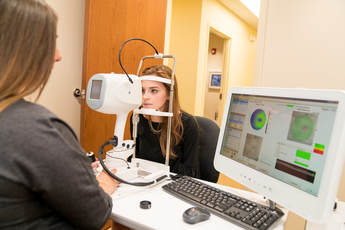Types Of Contact Lenses
Choice of lens is based upon doctor recommendation and patient need.
CONTACT LENSES FOR DRY EYES
With advances in optical technology, most people can use contact lenses, regardless of the type or extent of their vision problems. This is true even for patients with dry eyes who previously found that contact lenses intensified the symptoms of their condition, making them even more uncomfortable.
RECYCLING AND SUSTAINABILITY
Wichryk Eye participates in the One By One recycling program, which partners with TerraCycle to reduce plastic waste caused by contact lens use. Used contacts and their plastic blister packs are non-recyclable; they actually fall through the mechanical sorting equipment and end up in the landfill. By sending them to TerraCycle, they are able to be properly recycled. We recycle all lenses used in our practice, and welcome our community members to bring us their used (liquid free) blister packs and contacts to add to our monthly recycling shipment to TerraCycle.
- DAILY - Daily-wear soft contact lenses are the most popular type of contacts available. Made of a flexible plastic polymer, daily-wear lenses are put in each morning and taken out each night. Daily-wear contacts come in many colors and are designed to be worn for one day, eliminating the need to purchase cleaning solutions.
- DISPOSABLE-WEAR LENSES - Disposable soft lenses are intended to be discarded and replaced after they have been worn for a certain period of time. This makes them even easier to maintain than regular soft contacts. Many disposable lenses are designed for either replacement every morning, every two weeks or every month. Daily-wear disposables are worn during waking hours only, while extended-wear disposables can be worn during sleep as well.
Choice of lens is based upon doctor recommendation and patient need.
CONTACT LENSES FOR DRY EYES
With advances in optical technology, most people can use contact lenses, regardless of the type or extent of their vision problems. This is true even for patients with dry eyes who previously found that contact lenses intensified the symptoms of their condition, making them even more uncomfortable.
RECYCLING AND SUSTAINABILITY
Wichryk Eye participates in the One By One recycling program, which partners with TerraCycle to reduce plastic waste caused by contact lens use. Used contacts and their plastic blister packs are non-recyclable; they actually fall through the mechanical sorting equipment and end up in the landfill. By sending them to TerraCycle, they are able to be properly recycled. We recycle all lenses used in our practice, and welcome our community members to bring us their used (liquid free) blister packs and contacts to add to our monthly recycling shipment to TerraCycle.


